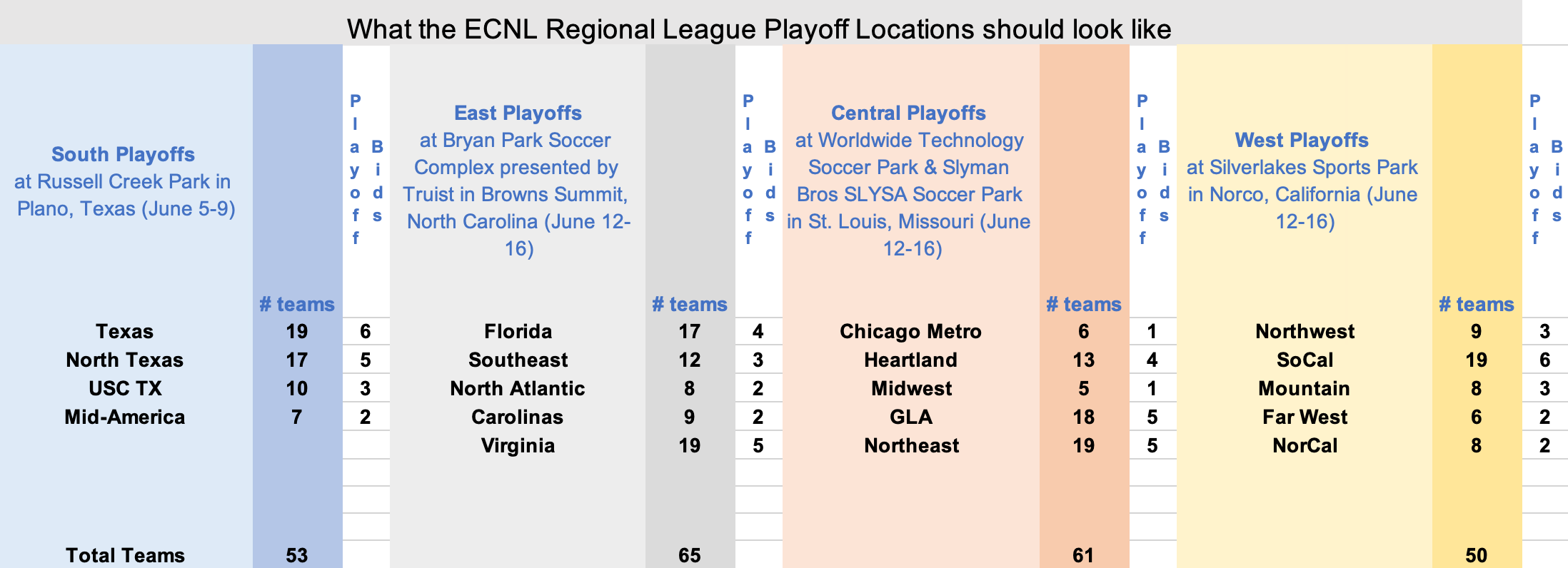The ECNL recently announced a major overhaul of the Regional League playoffs for the 2023-24 season.
This year, the boys' competition features 19 Regional League conferences comprising 229 clubs. These clubs are competing for 64 available playoff spots distributed across four distinct Regional League Playoff locations. Let's take a closer look at these playoff sites:
1. South Playoffs - Russell Creek Park in Plano, Texas
2. East Playoffs - Bryan Park Soccer Complex presented by Truist in Browns Summit, North Carolina
3. Central Playoffs - Worldwide Technology Soccer Park & Slyman Bros SLYSA Soccer Park in St. Louis, Missouri
4. West Playoffs - Silverlakes Sports Park in Norco, California
One noteworthy aspect the ECNL did not disclose with this release of information was how the conferences would be assigned to these playoff locations. The absence of this information, coupled with some unconventional choices for playoff sites and the decision to opt for four playoff locations instead of perhaps having 8, raises concerns about the assignment process and the potential for dissatisfaction among participating teams.
The ECNL justified its choice of playoff locations by citing geographical proximity as a means to manage travel for teams from the surrounding ECNL Regional Leagues. However, this rationale may not entirely align with the actual distribution of teams and their locations.
Determining the appropriate allocation of teams to these playoff locations is a complex undertaking. It necessitates consideration of several factors, including the locations of the teams, travel distances, and the number of teams within each region.
Initially, it may appear that the ECNL's aim was to ensure equity and fairness in terms of travel distances for all participating teams by establishing four different Regional League Playoff locations. The intention seems to be avoiding situations where some teams have significantly shorter or longer travel distances compared to others within their respective Regional League playoffs.
However, one key factor overlooked by the ECNL is that out of the 229 clubs in the Regional League, a significant number (85 clubs) are situated in the original 13 colonies and Florida. Consequently, the league has a substantial concentration of East Coast teams. This issue is exacerbated when considering teams from conferences that include East Coast teams. Despite this, the ECNL opted for just one playoff location to serve all these teams.
This decision has significant implications, as it will require at least one of the larger conferences to send their playoff teams to a location far from their regional base. Alternatively, multiple larger conferences may have to share a single playoff region, resulting in a less proportionate number of playoff spots for those conferences.
Upon reviewing the regional playoff locations and analyzing the locations of conference teams, we propose the following conference-to-location assignments to ensure the fairest allocation of playoff spots:

It's important to note that the teams in the Central Playoffs are likely to face the most significant travel challenges. While it may seem counterintuitive for teams from Buffalo, NY (GLA Conference) or Boston, MA (Northeast Conference) to compete in the Central Playoffs, there may be limited alternatives if the ECNL aims for equitable team allocation.
However, teams from the GLA Conference and Northeast Conferences should take some solace in this allocation. They won't be the only teams with a big commute, as many teams across various conferences could be looking at drives of eight or more hours to reach their respective "Region" playoffs. Moreover, Northeastern Conference teams enjoy shorter commutes during the season for their in-conference opponents. In some conferences many teams must drive over 7 hours just to play a conference opponent.
That brings up the the issue of conference alignment and the vast travel distances some teams endure to compete against conference opponents. It is certainly another topic that warrants examination in the future. As it raises questions about the rationale behind conference design and its impact on teams' logistical challenges.
For those who possess information about how the ECNL intends to manage these complexities, we invite you to share your insights with us at contact@rankingsoccer.com.

